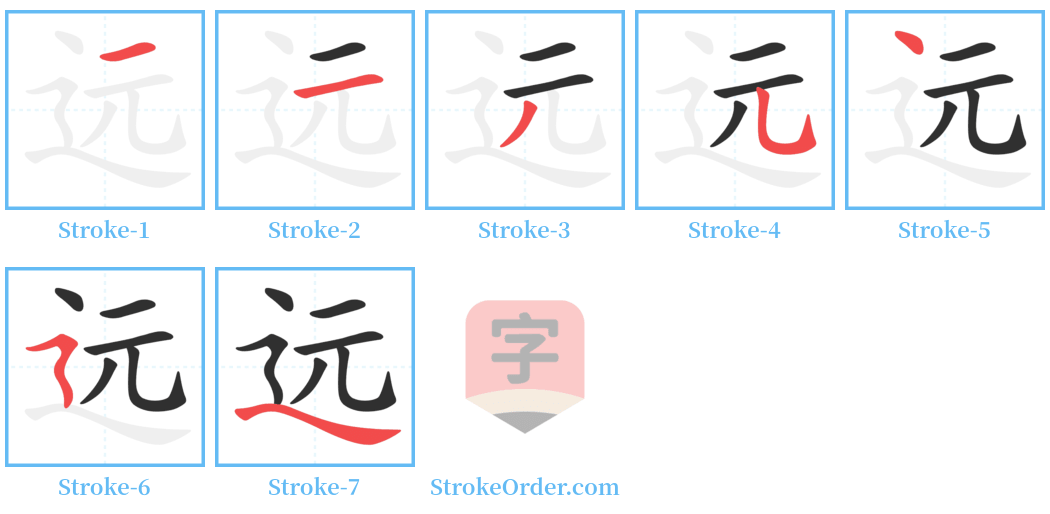远 Stroke Order
Animated Stroke Order of 远

Stroke Order Diagrams for 远

Step-by-Step Handwriting Guide for 远

Learn to Write Chinese Characters with Video Tutorials
Watch the video of writing the Chinese character "远", learn the correct stroke order (笔顺) of the character "远", and master the standard way of writing the character "远".
Free Printable Handwriting Practice with Stroke Order: 远
Printable Writing Practice Worksheet of "远" in Portrait Orientation (Tian Zi Ge)

Printable Writing Practice Worksheet of "远" in Landscape Orientation (Tian Zi Ge)

Information of 远
Pinyin
yuǎn、 yuàn
Radical
辶
Strokes
7 strokes
Usage
★★★★★
Definition
far / distant / remote
远
1. Distance is long; in contrast to "近" (close).
远 (yuǎn) refers to a significant distance when compared to something nearby.
Examples: 远方 (distant place), 远道 (long journey), 远程 (long distance), 远景 (distant view), 远足 (relatively long hike), 远见 (broad vision), 远虑 (far-reaching considerations), 远谋 (long-term plans), 远客 (distant guest), 遥远 (very distant), 远走高飞 (to travel far and high), 舍近就远 (to forsake the near and choose the far).
2. Long duration; time is long.
In this sense, 远 indicates a long period of time.
Examples: 远古 (ancient times), 远祖 (distant ancestors), 长远 (long-term), 永远 (forever).
3. Relationship is distant; not intimate.
This meaning pertains to the emotional distance between individuals.
Examples: 远亲 (distant relative), 疏远 (estrangement), 远支 (distant branch).
4. Profound.
Here, 远 suggests something that is deep or profound in understanding or implication.
Example: 言近旨远 (the words may be close, but their meanings are deep).
5. A surname.
远 can be used as a family name.
动词 (verb)
1. Leave; depart from; avoid; evade.
Examples: 君子远疱厨 (the gentleman avoids the kitchen), 远嫌 (to avoid suspicion), 远罪 (to keep away from wrongdoing).
2. Violate; go against.
An act of deviation from norms or principles.
Example: 远礼 (to contravene propriety), 远义 (to betray moral principles).
3. Keep at a distance; become estranged.
This meaning implies avoiding closeness or intimacy.
Examples: 亲贤臣,远小人 (associate with virtuous people and keep distance from the petty), 远斥 (to exclude, to cast out).
4. Expand; spread.
In a broader sense, it can refer to extending influence or reach.
Example: 远境 (to expand territory), 远达 (to reach great success).
5. Surpass; exceed.
To go beyond or achieve greater distance in terms of quality or quantity.
Example: 远逾 (to exceed), 远迈 (to surpass greatly).
名词 (noun)
1. Distant place; remote area.
Refers to locations that are far from the usual or central places.
Examples: 远投荒昧 (exiled to distant wild areas), 远人 (person from a distant place), 远驿 (remote post or station).
2. A surname.
远 can also denote family name.
Notes:
- 远 is often used in various contexts including distance, time, relational dynamics, and depth of thought.
- It is important to interpret the usage based on the surrounding context to grasp the nuance properly.
Distant water cannot quench present thirst / Slowness can not meet hasty demand. / The aid is too slow in coming to be of any help.
Input Method for 远
Pinyin
yuan3
Wubi
fqpv
Cangjie
ymmu
Zhengma
bdrw
Four Corner
31301
Unicode
U+8fdc
Same Pronunciation Characters